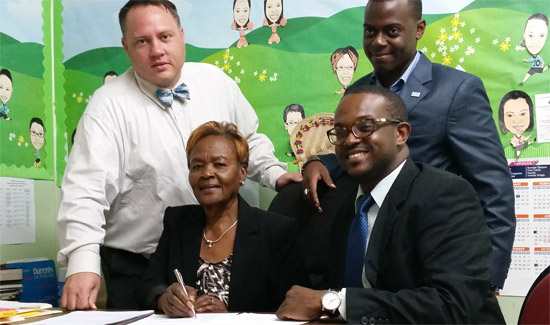 According to data from the Ministry of Education, students sitting the 2012 Bahamas General Certificate of Secondary Education (BGSCE) exams received an average letter grade of D in English and E+ in Mathematics. Yet, these are amongst the subjects that saw an improvement compared to last year’s results.
According to data from the Ministry of Education, students sitting the 2012 Bahamas General Certificate of Secondary Education (BGSCE) exams received an average letter grade of D in English and E+ in Mathematics. Yet, these are amongst the subjects that saw an improvement compared to last year’s results.
In 2011, the mean grade for Mathematics was an E- and a D for English Language, which did not see a letter grade improvement this year but had a GPA increase.
Minister of Education, Science and Technology Jerome Fitzgerald said his ministry is unhappy with the scores.
Nearly 50 percent of seniors at government high schools do not meet the requirements to graduate with a diploma, and are instead awarded leaving certificates, said Mr. Fitzgerald.
The Ministry of Education plans to double reading periods for students in grades 1 to 3 and increase math periods by almost 50 percent, in an effort to boost the performance of students.
He also said the ministry has to revamp its curriculum to include a career path stream that would accommodate students in vocational fields of study, and help them compete in today’s job market.
“We now have to pick up the pace to make sure that we prepare our young people for the jobs that are available out there for them, because they are leaving high school not graduating and not with any skills to move into the workforce, which has put them at a serious disadvantage.”
Mr. Fitzgerald said his ministry plans to work towards ensuring that students leave high school with reading and math skills at least “at the 9th grade level” and add more preschools to the public school system.
Eleven subjects saw an small increases in letter grades this year when compared to 2011. Eight subjects showed an improvement in grade point average (GPA) this year and six subjects saw a decline in performance this year compared to 2011: Art and Design; Biology; Chemistry; Food and Nutrition; Carpentry and Joinery and Religious Studies.
According to the data, 947 students received a C or above in five or more subjects compared to 937 students who scored similarly in 2011, representing a 1.07 increase.
This year, 1,594 candidates got a minimum grade of D in at least five subjects, representing a 2.54 percent increase from the 1,554 candidates who scored similarly in 2011, accordance to the report.
The report said that 7,117 students from 100 centers registered to sit the exam. This represents a 2.87 percentage decrease from 2011 when 7,327 candidates from 101 centers registered to take the exams.
This year, the Ministry of Education offered 27 subjects; however, the average number of subjects each student took was five.
The ministry’s report said that 9,009 candidates from 23 centers were registered to take the BJC exams.
Recent data released by the Department of Statistics revealed that only about 30 percent of the 190,075 people who make up the Bahamian workforce have completed some form of higher education.
The data, contained in the department’s Labor Force Survey, noted that only about 57,530 of those Bahamians completed college or another form of tertiary education.
The survey also noted that the majority of working Bahamians, 53 percent, have only completed high school. Two percent of the workforce had no schooling at all, while six percent went as far as primary school, according to the survey.
Source: Taneka Thompson,
The Nassau Guardian



